#vampterview meta
Text
Rewind the Tape —Episode 2
Art of the episode
Just like we did for the pilot, we took note of the art shown and mentioned in the second episode while we rewatched it, and we are sharing our findings with you. Did we miss any? Can you help us put a name to the unidentified ones? Do you have any thoughts about how these references could be interpreted?
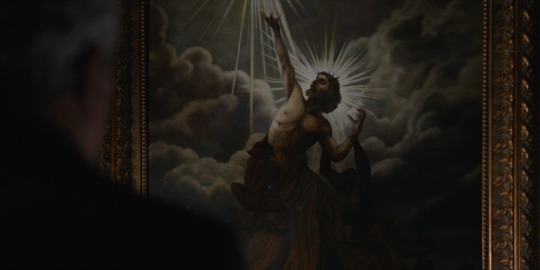
Unnamed painting by Marius de Romanus
Created for the show (uncredited artist).
Armand (still "Rashid") tells Daniel that Marius was a contemporary of Tintoretto (1518-1594).

Transformation
Ron Bechet, 2021
Bechet is a New Orleans-born visual artist. He's a relative of the early jazz pioneer Sidney Bechet. [Identified by Gizmodo's Linda Codega, here.]
Exhibition Prospect.5 says about the collection this piece belongs to: "Bechet carefully renders the ways vines wrap themselves around trees for support and access to sunlight. At times, this relationship serves both the vine and the tree. Works such as Transformation depict a harmonious symbiosis, as tree and vine both flourish. (...) Through his immersive compositions, Bechet invites us to see history and ourselves in relationship to the beauty, power, and violence of the natural world."
And, from Xula Gallery: "Here, we are gifted with the physical proximity of life and death – How they share the same organic space, how they sleep together as equals. The flora of South Louisiana's natural landscape is cleaved open to expose its roots. (...) Here is botany that has every potential of becoming monstrous. All of these meanderings are used to symbolize the deep historical roots of a family home and exhibits the precariousness of nature, both human and environmental, with all of its nurturing and destructive potential. (...) It is a diaspora body, skin folded back to reveal its elegant and resilient backbone."
Untitled photographs
Vivian Maier, undated

Maier was a street photographer whose work was discovered and distributed after her death —she took more than 150,000 photographs during her life, and never printed or circulated any. You can learn more about how her work came to light here.
We don't actually see the third picture, which hangs to the left, until episode four. Interestingly, that one is a self-portrait.
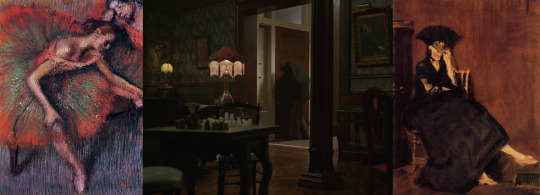
Dancers
Edgar Degas, 1899
Degas produced countless paintings of ballerinas throughout his career. While he is often considered an impressionist, he himself saw himself more as a realist and preferred harsh gritty subjects of working class backgrounds. Ballerinas at the time often came from working class or poor families and worked intense grueling hours. [Identified by @nicodelenfent, here.]
Berthe Morisot with a Fan
Edouard Manet, 1872
Manet was one of the first 19th-century artists to paint modern life, as well as a pivotal figure in the transition from Realism to Impressionism. The portrait in this scene shows his close friend, painter Berthe Morisot, wearing mourning blacks after the death of her father, but wearing a wedding ring —she was engaged to Manet's brother. [Identified by @nicodelenfent.]
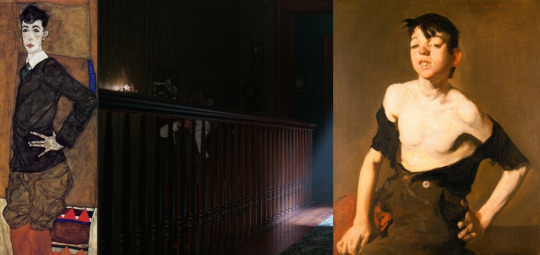
Portrait of Erich Lederer
Egon Schiele, 1912
The Schiele depicts a young Erich Lederer, son of art collectors Serena and August Lederer, whose collection was looted by the Gestapo. [Identified by @nicodelenfent.]
Paddy Flannigan
George Bellows, 1908
The Bellows depicts a young impoverished boy on the streets of New York. [Identified by @nicodelenfent.]


A Doll's House
Henrik Ibsen, 1879
Lestat tells Louis "They'll seat us late, and we'll miss Nora's entrance with the Christmas tree," which quite a few fans soon identified as a reference to this play, in which a housewife becomes slowly disillusioned with marital life and eventually leaves her husband. This conclusion led to the play being banned in certain countries, such as Germany and Britain, and Ibsen was compelled to write an alternative ending, in which Nora's husband forced her to stay.
In the two stage productions pictured above, you can see Kelsey Brennan and Nate Burger on the left, and Assad Zaman and Anjana Vasan on the right.
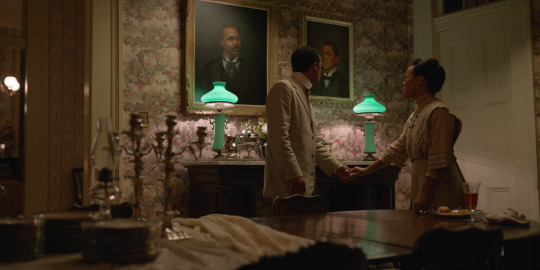
Unnamed paintings of Papa du Lac and Paul
Created for the show (uncredited artist).
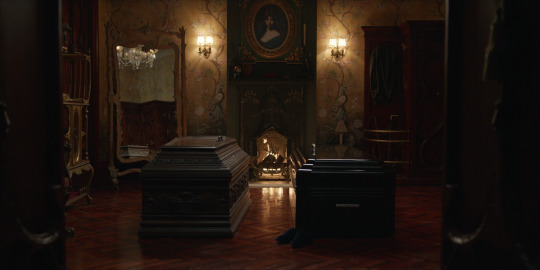
Unidentified painting*
* The running theory is that the woman in this painting is Gabrielle, Lestat's mother; which would mean this is another uncredited prop painted for the show.
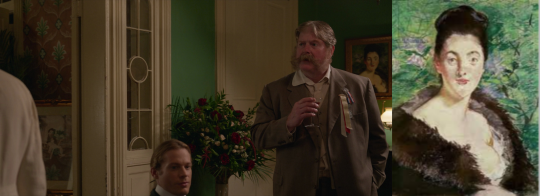
Woman in A Fur Coat
Edouard Manet, 1879
Additionally, on the bottom left corner of the frame you can catch a glimpse of another unidentified painting, but we couldn't get any clearer looks of it either.

Autumn at Arkville
Alexander H. Wyant, 1909
The one in the mirror and the one on the other side of the door are too blurry, but we managed to place the one on top of the couch! [Identified by @vfevermillion.]
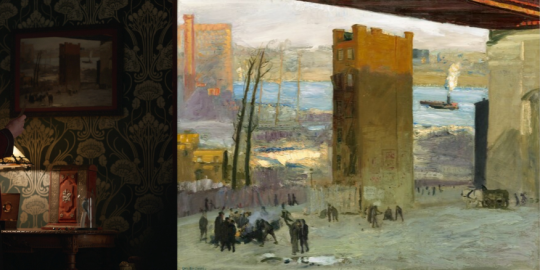
The Lone Tenement
George Bellows, 1909
The National Gallery of Art says about this painting: "Bellows has imbued the composition with a sense of eerie wistfulness, recording the precarious positions of those who were being displaced to make way for the future." [Identified by @nicodelenfent.]
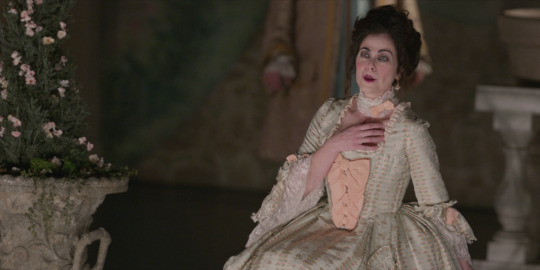
Don Pascuale
Gaetano Donizetti, 1842
The opera that Louis and Lestat go to at the end of the episode follows an elderly bachelor, who gets conned by his nephew Ernesto and his friend Malatesta into marrying the nephew's lover, Norina, under false pretenses. You can find a complete synopsis here.
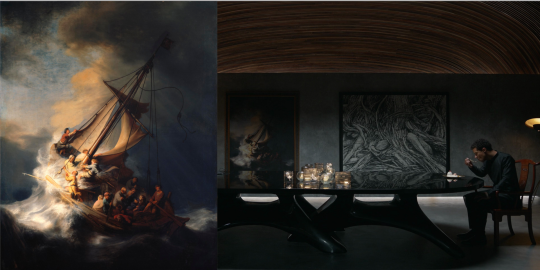
The Storm On The Sea Of Galilee
Rembrandt van Rijn, 1633
Rembrant van Rijn, Dutch Baroque painter and printmaker from the 17th century, is best known for his biblical and allegorical pieces. Rembrandt's only seascape was stolen from the Isabella Stewart Gardner Museum in Boston on March 18th, 1990, alongside other 12 works of art. The case remains unsolved. [Identified by Gizmodo's Linda Codega.]
If you spot or put a name to any other references, let us know if you'd like us to add them with credit to the post!
This week, we will be rewatching and discussing Episode 3, Is My Very Nature That of a Devil. We can't wait to hear your thoughts!
And, if you're just getting caught up, learn all about our group rewatch here ►
#louis de pointe du lac#daniel molloy#lestat de lioncourt#vampterview#interview with the vampire#iwtv#amc interview with the vampire#interview with the vampire amc#amc iwtv#iwtv amc#IWTVfanevents#rewind the tape#after the phantoms of your former self#analysis and meta#art of the episode
70 notes
·
View notes
Text
IWTV Ep6 - Rewind the Tape

"Costume designer Carol Cutshall spoke about how she used stripes and key motifs to symbolize the enclosing cage that the family home has become. Did you notice other ways —for example, color and light, shot framing and blocking, or set design— in which this theme is hinted at through the episode?"
@iwtvfanevents
The entire townhouse set is a cage--one of my favorite architectural elements is the ironwork. The only way in/out are through big ole iron gates (the front door itself, and the gate to the courtyard/drivethru) that creak like jail cell bars.

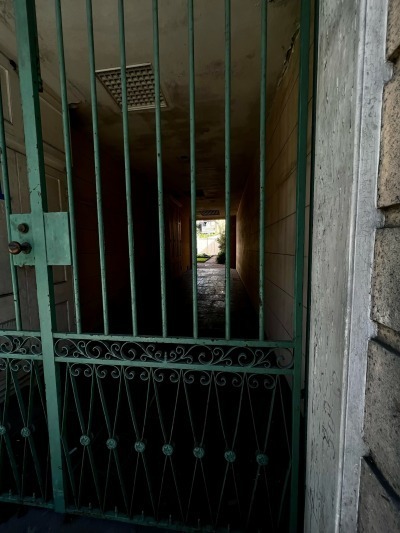
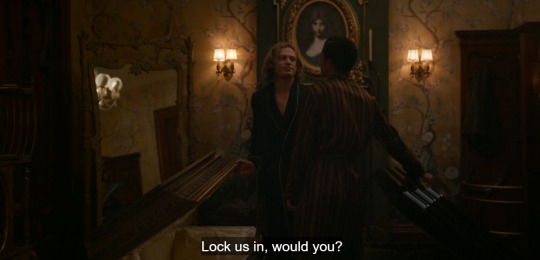

And it also reminds me of the bars & gates on NOLA crypts.

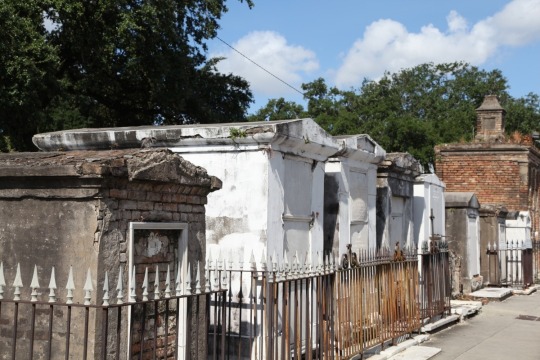
Louis & Claudia are constantly being compared to baby birds, which is so interesting when it comes to vampires (who in other lore can turn into bats & nightbirds like owls). Their wings have been clipped, their growth stunted (Lou voluntarily, Claudia involuntarily). The night he sees the Cloud Gift in full effect is rock bottom for Loustat.


It's painfully beautiful, just Loustat in the clouds, as Les tells him how much he loves him. But Lou just got his arse kicked six ways to Sunday, right before Lestat drops him a million miles in the air--Lou's TERRIFIED. He knows he's undead, but he doesn't KNOW what will happen to him, he's AFRAID of how much the drop's going to hurt--even if he knows/hopes it's possible for vamps to survive such a drop.
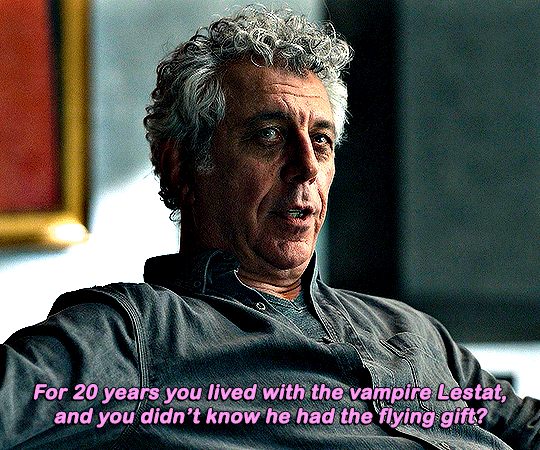
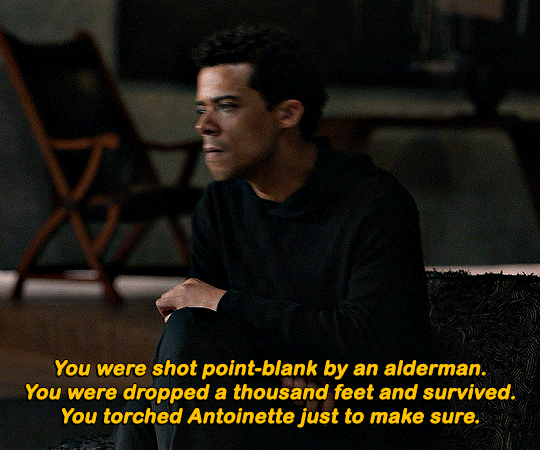
He's paralyzed, stuck in his coffin, unable to even WALK on his own anymore. He's an apex predator stuck in that coffin/house, no better than all the caged prey Claudia brought fed to him so he'd recover.
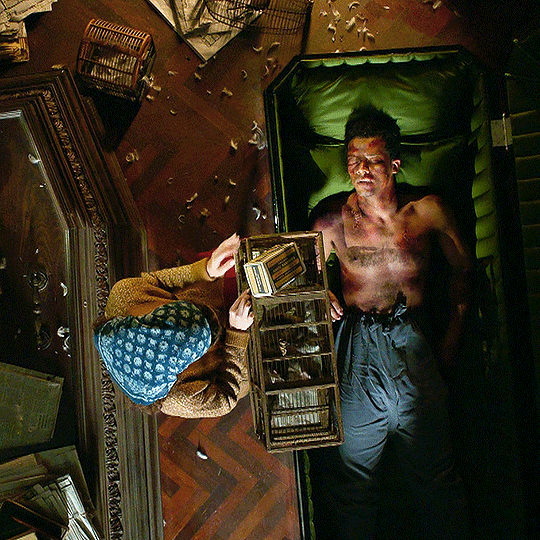
It's such a shock to his system that he can't even sleep, jolting awake whenever he feels the air on his skin, thinking he's STILL falling (and slowing down his healing by moving around with broken bones).
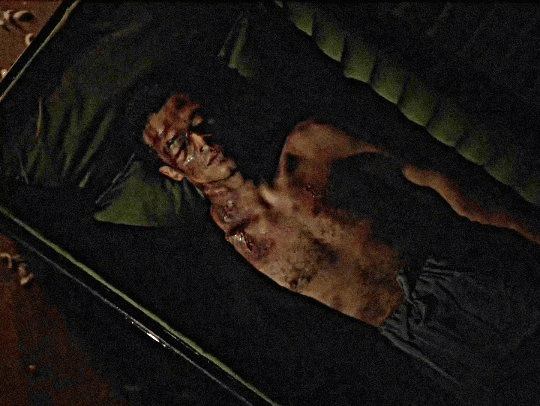
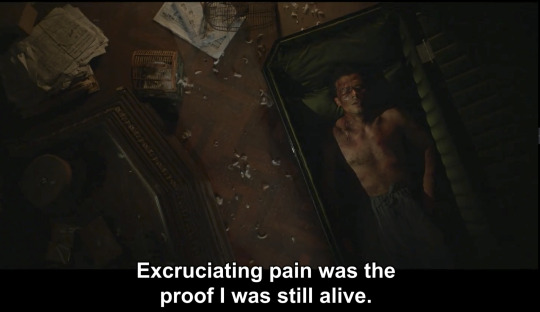
What used to make the love feel like free-falling in a "well with no bottom" is now just raw PTSD--"I loved Lestat with a wounded one."

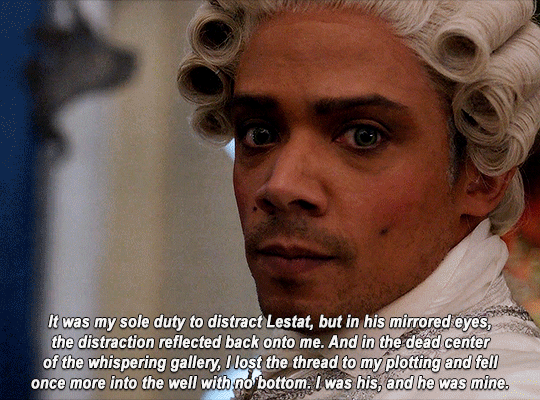

24 notes
·
View notes
Text
“A month from my wedding day, and what do I dream about? Dancing in my husband's arms? Children running in the yard? No, I dream of what a quiet breakfast might look like.”
Upon first appearance, Grace’s waspish remark provides us with a vital bit of establishing information about the timeframe (approximately three to seven weeks) that the events of the first episode takes place in. Context like this is important for an audience to have as it provides pacing to the plot and grounds the characters’ actions and thought processes. As the episode progresses though, the characters become increasingly unmoored as more and more contradictory information is revealed to the audience.
Louis begins his story in the autumn (“The year was 1910, the fall of the fifth year of my father’s passing”), and later states that his relationship with Lestat deepens over the winter (“It was a cold winter that year, and Lestat was my coal fire.”), which heavily suggests that several months are passing. Enough people see Louis and Lestat out together that gossip filters back to Grace (“Out cattin' with some white man, I hear.”). It is confirmed by Miss Carol that there are at least two weeks (“Miss Lily died, Mr du Lac. Two weeks ago.”) between Lestat and Louis’ night of passion and Paul’s funeral. Then there is Grace’s wedding itself, which goes on throughout the night and takes place entirely outdoors; contrasting his earlier statements about the season, Louis does not recall there being any marquees or braziers to protect the guests from potential cold or rain, and both Paul and Louis stop wearing their suit jackets after the ceremony.
Despite the numerous pieces of evidence that more than “a month” passes in the episode, this information was still accepted as accurate due to the placement of the line within the narrative. That was until an unseen image (the relevant shot in the fifth episode has Paul’s inscription out of frame) of the de Pointe du Lac family tomb was shared by the Anne Rice’s Immortal Universe Twitter account, clearly showing that Paul died on the 3rd May, 1911. Theorising subsequently began about an alternative timeline for the events of the first episode, with many using Louis’ opening of “1910, the fall” as the starting point and the revealed tomb inscription as the ending point. This new timeframe proposes that the events of the first episode occur over approximately six to eight months; critically, this is compatible with every other marker of time in the episode except for Grace’s comment. While it is important to note that Paul’s inscription has not been officially confirmed by the show, all the aforementioned time markers means that its exclusion cannot be easily dismissed as covering over a mistake made by the production team. A more productive question to ask is what is the significance of a deliberately confusing and likely misremembered timeframe to the story.
Firstly, it suggests that Louis’ recollections can be more emblematic than literal. Mealtimes and conversation among Louis’ family are noted in his narration (“Mornings with my family followed a pattern that year.”) to have been familiar and repetitive. It is this comfortable mundanity that Louis likely took for granted at the time, and, based on the warmth in which he describes his siblings in the present day, has deeply missed. It would make sense therefore that Louis would try and recount these scenes, but end up with something cobbled together from several half remembered conversations.
Secondly, this ambiguity does speak to how Louis’ relationship to time has changed over the years, something openly acknowledged by Louis in his letter to Daniel (“The passage of time and the frailties that accompany it have provided me perspective.”). The difference between a few weeks and several months must feel increasingly insignificant when you have already lived for more than a century. And to Louis, who has long since regretted becoming a vampire and gained awareness of the ways he was unable to make an informed decision about that, neither period is long enough to justify his loss of humanity. From this angle then, the shorter timespan would feel true to Louis, even if it is not literally so. Louis may be unaware of the discrepancies, or, relating back to the previous point, may be deliberately muddying the waters for the sake of more expressive and emotive storytelling.
Thirdly, it betrays the deep-rooted issues Louis has with agency and shame. Throughout the season, Louis often depicts his relationship with Lestat as though Louis were a passive subject, someone who was completely overwhelmed by foreign emotions (e.g. “My body was seized with weakness. His gaze tied a string around my lungs, and I found myself immobilized.”) and who took no purposeful action to continue that relationship (e.g. “You started hanging out?” “He was in love with my city and wanted to know everything he could about it.”). A similar plea to inevitability occurs when Louis describes why he became and tried to embrace being a vampire (“It is difficult to explain how his words disarmed me, how efficiently succinct and impenetrable his argument was. […] I completely forgot myself”). There is undeniably a lot of truth to Louis’ assertions that Lestat’s willpower was relentless and uncompromising, as well as how disorienting feelings of extreme grief and love can be to a person. It is also quite apparent that Louis played a more active role in his relationship with Lestat and engaged more deliberately with his own vampire nature than Louis’ narration wants to acknowledge; that Louis had some awareness of what was happening (e.g. Lestat’s romantic interest in him, Lestat having powers no ordinary human could), sufficient agency and power to have some other options available to him, and chose the paths he did anyhow. By remembering the period between meeting Lestat and becoming a vampire as significantly shorter than it was, Louis can try to convince himself that his greatest regrets in life are not due to any major fault of his own.
#I have been working on this since the weekend#so over double digit hours of writing#and I managed to get it down to just over a thousand words#expect some unhinged footnotes to be released in the next few days though#I am now forcibly tearing this meta out of my hands#Louis de Pointe du Lac#Grace du Pointe du Lac#Vampterview#Interview with the Vampire
11 notes
·
View notes
Note
Hey! I meant to send you an ask for the ask meme way earlier but the trailer dropped and i got completely derailed..
But here it is!
What is your favourite book genre and is there anything you would recommend? What is your favourite movie from your childhood? Do you have any unpopular IWTV opinions? Do you have any Season 2 theories you haven't seen anyone talk about? Do you have any Claudia headcanons specific to Paris? Do you think Claudia might be haunting Dubai? Are there any songs you think are very Claudia coded?
Here I am answering this ask 4-5 days later!
-What is your favourite book genre and is there anything you would recommend?
I tend to gravitate towards gothic horror and absurdist comedy (the two can often intertwine) For what I would recommend, it would depend on the person! Like, do you like something that involves romance? History? Leans more into the comedy aspect? Leans more into the horror aspect?
-What is your favourite movie from your childhood?
At 11 I got addicted to Titanic and became a huge Titanic nerd lol. It's funny because I actually thought it was a horror movie initially because I watched the second half first with a friend who just wanted to skip to the boat sinking (I had never watched a horror movie prior to this so watching the claustrophobic sinking room scenes and the multiple people dying in front of me traumatized me okay!!). I guess I'll go with Titanic since that's the one movie I still love today I'm not ashamed to admit :)
-Do you have any unpopular IWTV opinions?
Oh plenty. I've spoken about a lot of them but I guess I'll mention that the writers including what happened to Claudia in Episode 5 was not bad writing, but more just poorly set-up imo. I know a lot of people hated it when the episode came out, and threw accusations of exploitation and the writers adding it just for shock value, but I politely disagree with those takes even if I get where they're coming from.
(trigger warning for mentions of SA below)
Claudia in both the books and the show constantly suffers from a lack of autonomy. It is a huge aspect of her character. She is constantly touched and handled too freely, as if she were still a child, without her consent. Louis and Claudia's relationship gets very unhealthy as well, as a result of her creators designing an environment where she literally has no one else. Now that they have aged her up, this aspect is still present, but now the threats are different. Claudia in Season 1 is driven by freedom and romantic love, but has now reached a stage where any human she gets into a romantic relationship would either be a creepy relationship with teenage boys, or a creepy relationship with a pervert. So she then looks to finding love with other vampires. Then she finds out, like in the books, other vampires won't necessarily understand or respect her either. It's a depressing realization that makes her character even more tragic. I know people would have preferred her seeing her struggle on her own to the point of being driven home rather than having the assault take place, but because of Claudia's character development this season, and because the season was so tightly condensed, the plot they went with actually makes sense :( And in fact, Claudia was actually never driven home because of the assault. She was driven home when she realized what her purpose finally was, as she was feeling lost and like she didn't belong anywhere as a black teenage vampire for years ("I realized why they made me- to be Louis's sister). If she couldn't survive on her own, albeit with more struggles than other vampires would, she wouldn't have tried to leave in Episode 6 by herself with Louis's assurance she could get by alright.
The thing that also makes this non-exploitative and randomly placed to me is that they never show it, and explicitly emphasize that they will not be showing or revealing the details despite Daniel's pressing.
The thing I didn't like was how it was set up. Bruce, like Claudia, wants to find other vampires and form a gang, but when he has found Claudia, after a minute, without any warning, just instantly throws an etiquette book at her (?), gets angry, assaults her, then leaves? So was that just his goal his entire time? I get why people think it's a badly written plotline. It would have made much more sense if Bruce had been a creepy "Stanley from Silent Hill 3" type, who through stalking her across universities, leaves letters and weird gifts for her or something. Claudia would be initially intrigued, because, hello, other vampires exist after all! but soon becomes wigged out and starts ignoring his letters/mind messages to her. She would end up escaping him (or killing him), because he wouldn't leave her alone, and that experience might add to her desire to leave the country and face Lestat.
Do you have any Season 2 theories you haven't seen anyone talk about?
I actually don't see many people talking about Madeleine. I do have a theory that Madeleine parallels Claudia's human mother in a couple of ways. I have this headcanon that Claudia had a black father and a white mother (just going off on the fact that Bailey Bass is biracial, but you don't have to agree), and they were teenagers when they had her, so that's why her dad gave her to his family to take care of (I'm assuming Claudia's mother might have been disowned or ran off, or her family refused to raise her themselves). So Madeleine represents to Claudia her mother if she had lived, just like Madeleine sees Claudia as a daughter if she had lived. And because this is supposed to be a complicated relationship, as Claudia is the actual older one, probably still longing for romantic connection, and doesn't want to get stuck in another daughter role, the show might venture further than mother/daughter/friendship territory, because this is the AR universe so things will naturally get complicated. I totally get if others don't want them to go into that area though.
Do you have any Claudia headcanons specific to Paris?
I do feel like Paris is where Claudia has her own awakening, same as Louis. It's where she realizes she likes girls, as we see her in a vampire orgy scene with another woman. I also think Claudia is a bit of a stalker. She likes trailing Madeleine or other women, seeing the life she could have had if she had stayed human. She actually ironically shares that in common with Armand. I feel like Armand and Claudia will actually like each other at first, and see a lot of themselves in each other. But because Claudia can see trouble coming a million miles away, his act doesn't fool her for long like it does with Louis, so gradually tension starts to build. I feel like Armand in the show, unlike in the book, actually harbors some regret when it comes to killing Claudia.
Also Claudia sketching Madeleine when?
Another headcanon I have is that Claudia has to fight for scenes where she plays someone who isn't a child/doll (hence the red dress in that promotional poster/painting). She also wants to get involved in some of the playwrighting, which she does with Armand. She does this until she starts getting suspicious about him, and after she quits writing, she not coincidentally at all starts getting cast in babydoll roles again. Armand sucks!
Do you think Claudia might be haunting Dubai?
God I hope so I want her to be haunting Louis but especially Armand's ass. The reason Armand supposedly can be awake at any time is because he just can't sleep, what with Claudia constantly taunting and tormenting him!
Are there any songs you think are very Claudia coded?
-"Can't Catch Me Now" by Olivia Rodrigo- perfect for Claudia haunting Louis and Armand!
-"Daughter" by Beyonce
-"Brutal" by Olivia Rodrigo
-"Girls Just Want To Have Fun" by Cyndi Lauper
-"I've Got To Be Me" by Sammy Davis Jr.
-"Teen Idle" by Marina
-"Antagonist" by Nova Twins
-"Beating Like A Hammer" by Metric
-"Mama, I'm A Big Girl Now" (Hairspray)
-"Eat Your Young" by Hozier- I hesitate to add this one because the song is supposedly based around the Irish "A Modest Proposal", now a similar concept taking place in modern times, but the music video just strikes me as very Claudia coded. In it, the child in the nuclear family is created to fulfill the parent's needs, and is subsequently put into a box and told to be a certain way. The parents are hungry in a demanding society that metaphorically starves them to the point that they'll take drastic measures to fulfill that hunger, even if it means exploiting and metaphorically consuming their own children. And who is that if not Claudia with regards to Louis and Lestat?
Thanks for the ask friend! And sorry it took so long to answer <3
13 notes
·
View notes